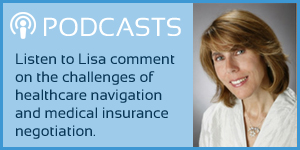Lisa’s Surprising Insights Into Aspects of the Affordable Care Act
- Aug
- 04
- Posted by lisaberryb
- Posted in Blog
I’m finally recovered from celebrating my 101st birthday, thank you. It took an entire month, but it was worth it! Parties, cakes, travels, and “life on the go,” just like I was 75 years old. Now my assignment is to rest up for the start of college football system, just four weeks away. With Stanford being ranked #4 in most pre-season rankings and my beloved USC ranked much, much lower, wish me luck living with two Stanford graduates. I don’t know if I can stand Stanford in another BCS Bowl game this season. The fans in our house are much too vocal . . . and I’m hard of hearing!
SOUL SHERPA® has been hard at work studying various components of the Affordable Care Act (ACA) which will provide practically all Americans with the opportunity to obtain health insurance, regardless of the existence of pre-existing conditions. While SOUL SHERPA® believes, in principal, this is a noble idea, Lisa has some concerns about the staff (“navigators”) who will be available to assist people obtain coverage, as well as just what type of insurance coverage and medical access will become available to consumers once coverage is obtained.
As a patient healthcare advocate, Lisa was concerned her work might be duplicated by the ACA’s “navigators.” After some research, it appears this will not be the case. As SOUL SHERPA® understands it, “navigators” will work only in the capacity to help consumers enroll in healthcare coverage through the state exchanges (“the Marketplace,”) which will begin open enrollment on October 1, 2013, for coverage beginning January 1, 2014. These “navigators,” all live in-person staff, will assist consumers only as it relates to understanding and securing coverage, and be paid $58 per person enrolled. None will serve as patient healthcare advocates in the traditional sense.
“Navigators” will be comprised of three types: (1) those working hands-on with medical insurance consumers, answering questions and aiding in enrollment; they will be paid $58 per enrollee by the federal government, (2) non-navigator assistance personnel providing hands-on assistance as well, but these positions fall under optional programs each state can decide whether to establish, and (3) certified application counselors who must undergo training and testing before being allowed to assist consumers in search of understanding and purchasing healthcare insurance.
In sum, the role of the ACA’s “navigators” will have little to do with the services provided by patient healthcare advocates. The “navigator” helps one obtain coverage; the patient advocate steps in when a medical problem arises and help is needed navigating the medical mountain that exists in understanding, consenting to, and hopefully recovering from successful treatment.
One disturbing fact Lisa uncovered has to do with Blue Shield of California’s medical insurance exchange options in Los Angeles, where SOUL SHERPA® performs much of its work. The policies being offered as a result of the passage of the ACA through their state exchange network includes approximately 24,000 physicians. Sound like a lot of options? Hardly.
If a person chooses to purchase a PPO policy with Blue Shield for coverage in Los Angeles, that subscriber will have access to approximately 66,000 physicians. Many doctors have already decided, as have UCLA Medical Center and Cedars-Sinai Medical Center (widely regarded as the top two hospitals in the greater Los Angeles area) they will NOT accept patients with medical insurance policies purchased through the state’s exchange (“Marketplace”) but only patients with PPOs. PPO policies are extremely expensive, with premiums increasing at an alarming rate. The state exchange policies are much less expensive, but as the old adage goes, “You get what you pay for.”
SOUL SHERPA® did not clearly understand the shortfalls of buying medical insurance through the California state exchange until Lisa read several articles to research these aspects of the ACA. She finds many aspects disturbing, as the ACA clearly does not mean the same thing for all consumers. Two people can have medical insurance, but depending upon the type, their medical options are clearly NOT the same. SOUL SHERPA® encourages its readers to conduct their own research before buying any insurance plan. As for help, if you need it, ask for it. This issue is extremely important and cannot be understood on merely a superficial level.
The article Lisa found most helpful in her research can be found on Health Affairs Blog, posted July 13, 2013, by Timothy Jest, http://healthaffairs.org/
This information is protected by copyright © 2010 Health Affairs Project HOPE – The People-to-People-Health Foundations, Inc.
Contact Information
- 818.512.6803
- lisaberryb@stanfordalumni.org
- Follow DependableDoc© on Twitter!
Services Cover:
- Medical
- Legal
- Financial
- Insurance
- Emotional Support






